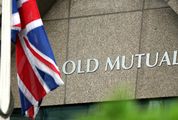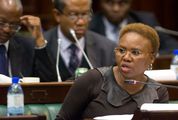Source:

BUSINESS DAY TV: Potential implications of investment protection bill
by Transcript service,
2015-11-19 16:29:12.0
STEFAN Sakoschek is the executive chairman of the European Union Chamber of Commerce and Industry in Southern Africa.
BUSINESS DAY TV: Trade and Industry Minister Rob Davies says there are no signs that foreign investors have been frightened off by the planned adoption of the Protection of Investment Bill. So are all the concerns about the bill unfounded and do foreign investors still see South Africa as being open for business? Joining us on News Leader with his views is Stefan Sakoschek, executive chairman: EU Chamber of Commerce and Industry in SA.
Stefan, this bill was passed last night by MPs in the National Assembly despite opposition from opposition parties. Is it a disaster or a misstep?
STEFAN SAKOSCHEK: Neither-nor, but it remains to be seen what the long-term effects are going to be and I understand very well Minister Davies’s message, and the front page news — BMW invests another R6bn in South Africa and the likes — but what we have to keep in mind is those sorts of decisions are long-term decisions that have been made some time ago. I also qualify the investment of VW and there are going to be a few more in the agri-industry sector and pharmaceutical sector.
But these are welcome exceptions to the rule, perhaps, and the few companies that are still investing are, in effect, implementing a strategy that they had designed a while back. So it’s a bit early to draw conclusions from the effect of those last investors.
BDTV: In fact, we’ve had Minister Davies say there is in fact no real correlation between the existence or nonexistence of a bilateral treaty and actual inflows of investment. From the chatter you’re hearing amongst business right now, what are you hearing?
SS: Okay, thanks for that question. What I’m hearing is — in fact, I’ve taken the extra effort to go and see about 35 of our CEOs presently in South Africa over the last 16 weeks and the consensus across the board is very similar — we’re placing a lot of focus on the investment bill but it comes as the last of a series of things that have happened over the last year and a half, starting with the gradual cancellation of the 45 BITs and then the new BBBEE codes and then the volatility of the rand which came as a result of commodity prices but also China’s growth rate and their inability to buy as much commodities from us.
So a whole host of things have happened during the last 16 or 18 months and the bill doesn’t come ... I don’t want to say it comes as 'the last cherry on the cake' ... but it certainly doesn’t add to the general discomfort that is felt by investors in South Africa.
BDTV: So you’re saying it doesn’t add or it adds to general discomfort but it’s not going to be the thing that will cause investors to pull out of South Africa or alternatively not actually invest in South Africa?
SS: We have to look at South Africa in respect of the other destinations which are potential investment destinations on the continent and in South East Asia and in the Middle East and in fact in Mauritius. So what the guys are saying the operators here are very focused and we have to also take a further step back and go all the way back to Europe in fact when you have heads of big corporates which are sitting in Paris or London or Stuttgart or elsewhere and who look at Africa, and particularly South Africa, as yet another investment destination. The guys are looking at a return on investment. Business is brutal and at the end of the exercise if you don’t get your return on investment then you will select another investment destination where perhaps your currency is a bit stronger or where the climate generally speaking is more favourable to foreign investment. It probably boils down to that. So it’s not a target exercise at the bill in particular, it’s just the general climate.
We have a marriage with South Africa, European businesses. Some companies have been here for 150 years. I believe Siemens has been here for 150 years, to talk about the others but it is a long-term relationship and when the rules change in a relationship it raises a lot of questions. It basically reinstates the need to re-evaluate all the options that are out there in the market to manufacture and to invest.
BDTV: One of the arguments that has been put on the table is the framework that’s been provided by the Constitution and other legislation already provides strong enough protection to investments. Why is that not enough?
SS: There are a lot more attractive, not to call them 'sexy' destinations in the world, and particularly in the southern hemisphere, Brics included or all of the countries included. Brics for that matter, even the eastern countries are trying to attract FDI (foreign direct investment). I don’t think it’s a secret, we’re often repeating the same things. From a macroeconomic perspective we know very well where South Africa is. We have a growth rate which is short of anaemic which is 1.4%, we have a trade deficit, we have a budget deficit, so we have a whole host of factors which are not helping to begin with.
And if we increase the burden and if we increase ... I don’t want to call it barriers to trade but psychologically that’s what the operators and what the CEOs are saying. They are now becoming a lot more cautious about South Africa as an investment destination because they cannot forecast a positive return over the next year or two years. So we’re somewhat back to a wait-and-see attitude.
BDTV: How important to your members is having recourse to international arbitration because that’s one of the things that this bill doesn’t really allow foreign companies operating in South Africa?
SS: It is essential, it is the notion of third party and I understand Minister Davies when he mentions these figures which are expensive to the state to do international arbitration.
But the notion of a third party is key in a debate. So when you’re confronted with basically the party that you want to legislate against or for you don’t have the impression, it’s a psychological effect. You want a third party to be able to intervene and to call the shots in the end.
BDTV: Have European companies actually ever used those third parties? Have they ever had to in their operations in South Africa?
SS: No it’s not been the case in recent history but we still have the total psychological effect of the long list of things that have happened, and the investment bill is the last one, which basically gives an excuse to reassess investment destinations. Again, we’re saying the same thing over and over ... I’m just drawing attention... In fact it’s been a function of the EU Chamber to wave the red flag and we’ve been very involved and robustly engaging in the negotiations on the bill.
The next item on the list (we don’t only advocate to lobby in favour of one particular bill) but there are 17 acts in the pipe and we’ll be busy with those and we want to maintain an engaged relationship and a constructive one with South Africa because we’re so heavily invested. I remember for those who didn’t watch the last time that we represent literally 80% of FDI. If you throw in the American companies they represent another 5% of FDI and they’re so heavily invested that we have to get involved at every step along the way. As the EU Chamber, on behalf of our members, we have to defend our interests and wave the flag and say "look, South Africa, we are here, we are employing 450,000 people, let’s work together on maintaining a favourable investment climate", and right now we can’t help carrying the word across that our CEOs are not happy at the moment.
STEFAN Sakoschek is the executive chairman of the European Union Chamber of Commerce and Industry in Southern Africa.
BUSINESS DAY TV: Trade and Industry Minister Rob Davies says there are no signs that foreign investors have been frightened off by the planned adoption of the Protection of Investment Bill. So are all the concerns about the bill unfounded and do foreign investors still see South Africa as being open for business? Joining us on News Leader with his views is Stefan Sakoschek, executive chairman: EU Chamber of Commerce and Industry in SA.
Stefan, this bill was passed last night by MPs in the National Assembly despite opposition from opposition parties. Is it a disaster or a misstep?
STEFAN SAKOSCHEK: Neither-nor, but it remains to be seen what the long-term effects are going to be and I understand very well Minister Davies’s message, and the front page news — BMW invests another R6bn in South Africa and the likes — but what we have to keep in mind is those sorts of decisions are long-term decisions that have been made some time ago. I also qualify the investment of VW and there are going to be a few more in the agri-industry sector and pharmaceutical sector.
But these are welcome exceptions to the rule, perhaps, and the few companies that are still investing are, in effect, implementing a strategy that they had designed a while back. So it’s a bit early to draw conclusions from the effect of those last investors.
BDTV: In fact, we’ve had Minister Davies say there is in fact no real correlation between the existence or nonexistence of a bilateral treaty and actual inflows of investment. From the chatter you’re hearing amongst business right now, what are you hearing?
SS: Okay, thanks for that question. What I’m hearing is — in fact, I’ve taken the extra effort to go and see about 35 of our CEOs presently in South Africa over the last 16 weeks and the consensus across the board is very similar — we’re placing a lot of focus on the investment bill but it comes as the last of a series of things that have happened over the last year and a half, starting with the gradual cancellation of the 45 BITs and then the new BBBEE codes and then the volatility of the rand which came as a result of commodity prices but also China’s growth rate and their inability to buy as much commodities from us.
So a whole host of things have happened during the last 16 or 18 months and the bill doesn’t come ... I don’t want to say it comes as 'the last cherry on the cake' ... but it certainly doesn’t add to the general discomfort that is felt by investors in South Africa.
BDTV: So you’re saying it doesn’t add or it adds to general discomfort but it’s not going to be the thing that will cause investors to pull out of South Africa or alternatively not actually invest in South Africa?
SS: We have to look at South Africa in respect of the other destinations which are potential investment destinations on the continent and in South East Asia and in the Middle East and in fact in Mauritius. So what the guys are saying the operators here are very focused and we have to also take a further step back and go all the way back to Europe in fact when you have heads of big corporates which are sitting in Paris or London or Stuttgart or elsewhere and who look at Africa, and particularly South Africa, as yet another investment destination. The guys are looking at a return on investment. Business is brutal and at the end of the exercise if you don’t get your return on investment then you will select another investment destination where perhaps your currency is a bit stronger or where the climate generally speaking is more favourable to foreign investment. It probably boils down to that. So it’s not a target exercise at the bill in particular, it’s just the general climate.
We have a marriage with South Africa, European businesses. Some companies have been here for 150 years. I believe Siemens has been here for 150 years, to talk about the others but it is a long-term relationship and when the rules change in a relationship it raises a lot of questions. It basically reinstates the need to re-evaluate all the options that are out there in the market to manufacture and to invest.
BDTV: One of the arguments that has been put on the table is the framework that’s been provided by the Constitution and other legislation already provides strong enough protection to investments. Why is that not enough?
SS: There are a lot more attractive, not to call them 'sexy' destinations in the world, and particularly in the southern hemisphere, Brics included or all of the countries included. Brics for that matter, even the eastern countries are trying to attract FDI (foreign direct investment). I don’t think it’s a secret, we’re often repeating the same things. From a macroeconomic perspective we know very well where South Africa is. We have a growth rate which is short of anaemic which is 1.4%, we have a trade deficit, we have a budget deficit, so we have a whole host of factors which are not helping to begin with.
And if we increase the burden and if we increase ... I don’t want to call it barriers to trade but psychologically that’s what the operators and what the CEOs are saying. They are now becoming a lot more cautious about South Africa as an investment destination because they cannot forecast a positive return over the next year or two years. So we’re somewhat back to a wait-and-see attitude.
BDTV: How important to your members is having recourse to international arbitration because that’s one of the things that this bill doesn’t really allow foreign companies operating in South Africa?
SS: It is essential, it is the notion of third party and I understand Minister Davies when he mentions these figures which are expensive to the state to do international arbitration.
But the notion of a third party is key in a debate. So when you’re confronted with basically the party that you want to legislate against or for you don’t have the impression, it’s a psychological effect. You want a third party to be able to intervene and to call the shots in the end.
BDTV: Have European companies actually ever used those third parties? Have they ever had to in their operations in South Africa?
SS: No it’s not been the case in recent history but we still have the total psychological effect of the long list of things that have happened, and the investment bill is the last one, which basically gives an excuse to reassess investment destinations. Again, we’re saying the same thing over and over ... I’m just drawing attention... In fact it’s been a function of the EU Chamber to wave the red flag and we’ve been very involved and robustly engaging in the negotiations on the bill.
The next item on the list (we don’t only advocate to lobby in favour of one particular bill) but there are 17 acts in the pipe and we’ll be busy with those and we want to maintain an engaged relationship and a constructive one with South Africa because we’re so heavily invested. I remember for those who didn’t watch the last time that we represent literally 80% of FDI. If you throw in the American companies they represent another 5% of FDI and they’re so heavily invested that we have to get involved at every step along the way. As the EU Chamber, on behalf of our members, we have to defend our interests and wave the flag and say "look, South Africa, we are here, we are employing 450,000 people, let’s work together on maintaining a favourable investment climate", and right now we can’t help carrying the word across that our CEOs are not happy at the moment.






















Login OR Join up TO COMMENT